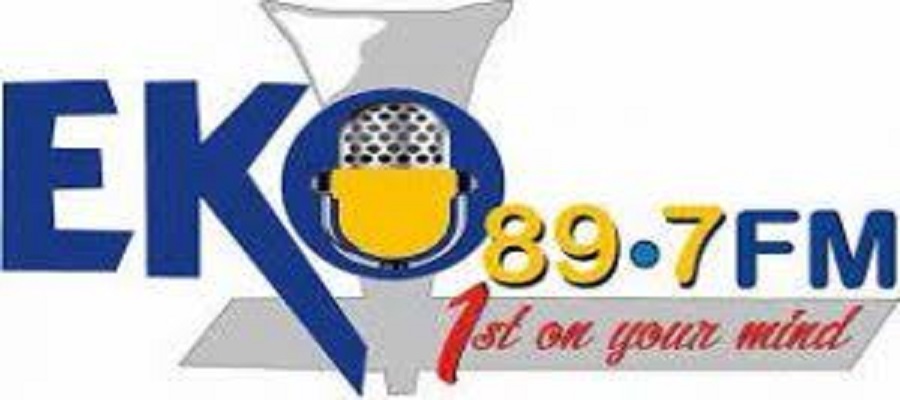Broadcasting
NLC Shuts Lagos TV, Radio Stations over non-Implementation of N85,000 Minimum Wage

Nigeria Labour Congress (NLC), Lagos State chapter has shut down normal operations of Lagos Television, Eko FM/Radio Lagos and Lagos Traffic Radio in protest over the non-implementation of the N85,000 minimum wage to workers,

NLC, in collaboration with workers of the three broadcast stations under the aegis of Radio, Television, Theatre and Arts Workers Union of Nigeria (RATTAWU), on Monday picketed the station.
The workers, few weeks ago, had notified the management of the three stations of their readiness to down tools following the failure of the stations to implement the minimum wage being implemented by the Lagos State Government.
The workers were seen on Monday morning blocking the entrance and exit to the Agidingbi complex of the broadcast stations, displaying placards.

The placards with various inscriptions read, “Oracle is the answer, it’s all we need”, “Pay us minimum wage,” among others.
Speaking with newsmen, Comrade Funmi Sessi, chairman of NLC, said the protest was peaceful to draw the attention of the management to the demands of workers.
“We started in a peaceful manner, and we are going to end it in a peaceful manner. No body is going to push us the wall.
“I assure everybody that we shall be peaceful because we are Lagosians.
“We are here this morning you can see the workers of government in communication departments that is LTV, Eko FM, Traffic Radio, all here to show their displeasure against the injustice that is been meted out to them.
“They work to the best of their abilities and now at the receiving end by being shortchanged. And not receiving the new minimum wage as being approved and agreed by the law set by the Federal Government of Nigeria
“This is an injustice to the set of workers. The managements have been given the mandate to pay the minimum wage has been announced by the Lagos State Government. They are Lagos State workers.
“Since the government has commenced implementation of the N85,000 minimum wage since November, they have never collected the minimum wage.
“The arrears of the three months and the 13th months; they have not been enjoying the benefits. So, why this disparity for these set of workers even in the face of this hardship?
The leadership of their union had engaged the management previously. They gave a-21-day notice to dialogue.
“After several engagements with managements, they gave 14 days, then seven days. They followed due process, yet there was no resolution. Now when they saw that the workers are resolute to fight for their right, they are saying sheathe your sword.”
Comrade Sessi noted that the state governor had been doing a lot by showing compassion on workers, urging him to prevail on the management to do the needful.
“Though, the governor has been doing a lot and showing empathy to workers, we are hereby appealing to him to prevail on the management to do the needful and avoid unnecessary disruption to operations in the interest of the majority.
“We will sustain this struggle until the government listens and takes appropriate action on these demands,” she said.
Broadcasting
DG NCC Tasks University Dons on Research Commercialization, IP Management to Build Global Competitive Ecosystems

Dr. John Asein, director-general, Nigerian Copyright Commission (NCC), has charged universities to leverage Intellectual Property (IP), innovation management and research commercialisation to build vibrant, sustainable and globally competitive ecosystems.

The DG stated this while delivering a paper on: ‘’Research Commercialisation, IP Policy and Innovation Management’’ at the Committee of Vice-Chancellors of Nigerian Universities (CVCNU) organised Business Clinic themed: Unlocking University-Driven Business Ecosystems: Innovation, Partnerships and Sustainable Enterprise Models in Abuja.
The programme was targeted at engaging Vice-Chancellors, principal officers and other key officers in Nigerian Universities in a practical dialogue on how to transit their institutions into thriving business ecosystems through innovation, enterprise development and strategic partnerships.
In his presentation, Dr. Asein, disclosed that Universities are now recognised as engines of national development and innovation hubs that must connect scholarship to business.
He noted that with over 300 Universities in Nigeria, there is need for structured pathways to turn ideas into commercial outcomes while attention should be focused on IP assets in our universities in order to harness them in a safe, sustainable and satisfactory manner.
The DG NCC speaking further on leveraging resources from the creativity locked up within the university system, harped on the need to harness the soft power of our youth as Nigeria’s most valuable natural resources are its people.
Drawing demography from Nigeria youthful population, he observed that over 70 percent of Nigerians who are under the age of 30 are mostly in the university system studying. These youths, he noted, shape cultures, technology and innovation through creativity and digital skills.
He tasked universities to become innovation factories where young people can explore ideas, protect their IP and grow startups by integrating innovation culture, entrepreneurship training and IP awareness into its learning environment.
He equally urged Universities to look beyond the sciences to commercialize traditional knowledge-based innovations and harness the potentials in the creative arts disciplines like music, visual arts, theatre arts and others for commercial outcomes.
Dr. Asein, recommended that universities as centres of learning, should take the lead in using the IP system for promoting education and learning, wealth creation, revenue generation and institutional development.
Underscoring the need for all universities to have an IP Policy, he noted that the Model developed by the Nigerian Copyright Commission in partnership with the CVCNU is a good starting point.
The Secretary-General, CVCNU, Prof. Andrew Haruna, presented the welcome address at the event while the Director, Technology Innovation and Commercialisation, NOTAP, Mrs. Adah H.N. Mokolo-Oladunke represented the Director-General, NOTAP at the event.
The 2025 CVCNU Business Clinic witnessed attendance from representatives of Public and Private Universities across the 36 States in Nigeria.
Broadcasting
US invests $115m in counter-drone tech for World Cup security


Drone
The US Department of Homeland Security (DHS) will invest $115 million in counter-drone technology to safeguard the 2026 FIFA World Cup and events marking America’s 250th independence anniversary, creating a dedicated office for rapid drone system deployment.
Homeland Security Secretary Kristi Noem described drones as “the new frontier of American air superiority,” stressing the need to counter threats from drug cartels using unmanned aircraft for smuggling and surveillance, alongside incidents like a 2025 NFL stadium drone flight and 2024 New Jersey sightings.
The funding supports 11 World Cup host cities expecting over one million visitors, building on FEMA’s $250 million grants to those states and addressing risks heightened by cartels’ advancing tech, including a reported FBI tracking plot in Mexico.
DHS has conducted over 1,500 counter-drone missions since 2018, with the new Program Executive Office accelerating acquisitions amid President Trump’s border security push.
Broadcasting
Youth Talent Takes Center Stage as T2 Ignites High-Octane Rap Battles @ Carnival Calabar

The energy at the Carnival Calabar Music Concert reached a new high as T2 introduced a first-ever rap battle platform, giving young Nigerians an electrifying stage to showcase their talent, creativity, and self-expression while competing for exciting prizes.

Held at the U.J. Esuene Stadium, the activation blended pulsating music, vibrant culture, and youthful energy into a dynamic celebration that kept thousands of carnival-goers fully engaged from start to finish.
Eight fearless contestants stepped into the spotlight, going bar for bar in an intense lyrical showdown. Rappers fused local languages, pidgin, and sharp punchlines, creatively weaving the T2 brand into their verses.
Anchored by the energetic hosting duo MC Double I and MC Princess, the rap battles thrilled over 16,000 attendees, including the Governor of Cross River State, Senator Bassey Otu, delivering an unforgettable showcase of youth talent and cultural expression.
With prizes including fridges, gas cookers, sound systems, and airtime top-ups, the competition remained fierce throughout the night. After two high-energy rounds narrowed the field to a five-man final duel, Emmanuel Eye emerged as the overall winner, taking home the grand prize — a fridge.
“I never expected this at all,” Emmanuel said. “I came to the concert like anyone else, and hearing about the T2 rap battle was a surprise. When I got the chance to perform, I just went for it. Being named the overall winner is amazing, and I’m grateful to T2 for creating this platform to showcase our talent.”
Beyond the stage performances, T2’s presence added a digital layer to the carnival experience. As part of its role as Digital Technology Partner of Carnival Calabar, the brand introduced the MyT2 App as a lifestyle companion, while also enabling line reactivations, airtime top-ups, and instant rewards for hundreds of attendees, blending technology seamlessly into the live celebration.
Commenting on the activation, Chinelo Manefo, Specialist, Events and Sponsorship at T2, said:
“The energy from both the rappers and the crowd was incredible. This platform reflects exactly what T2 aims to create — a celebration of youth, creativity, and culture, enhanced by technology that connects people and experiences. Seeing the audience so immersed shows how music and performance can empower the next generation.”
The Carnival Calabar Music Concert, headlined by Tiwa Savage, Timaya, and top local performers, was further energized by T2’s interactive rap battle platform. By blending music, culture, youth expression, and digital innovation, T2 reinforced its commitment to championing Nigeria’s next generation, giving young creatives a stage to shine while enriching how they experience the festival.

 General News3 days ago
General News3 days agoCybersecurity Firm Detects a Wave of Crypto Phishing Following BlockFi Bankruptcy

 News3 days ago
News3 days agoIMF Upgrades Nigeria’s 2026 Growth Projection to 4.4%

 Telecom3 days ago
Telecom3 days agoNCC Unveils Spectrum Roadmap to Power Nigeria’s $1tr Digital Economy

 Telecom2 days ago
Telecom2 days agoSpacecoin Secures Licenses to Roll Out Satellite Connectivity in Nigeria, Kenya

 Telecom3 days ago
Telecom3 days agoNCC Gives Amazon’s Kuiper, BeetleSat Nod to Provide Satellite Broadband Services in Nigeria

 News3 days ago
News3 days agoNew Horizons Invests N50m to Empower Almajiris with Skills

 General News3 days ago
General News3 days agoFG Rejects Northern Elders’ Gold Refinery Siting Claim

 E-Financial3 days ago
E-Financial3 days agoKongaPay K-Save Users Save over N3.2Bn

























